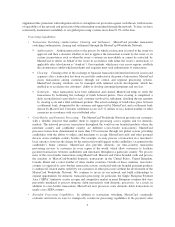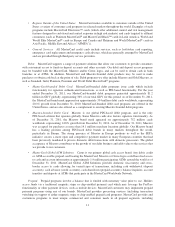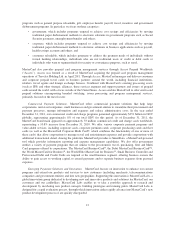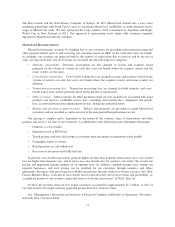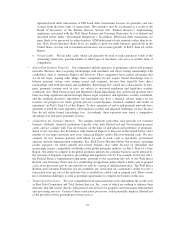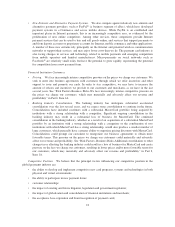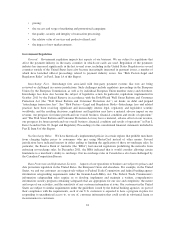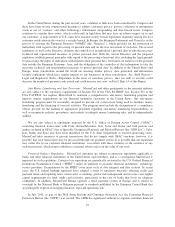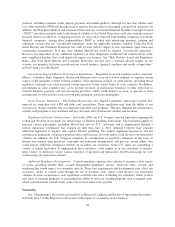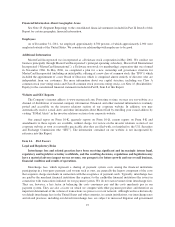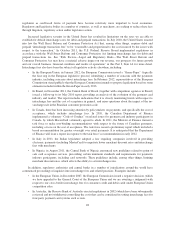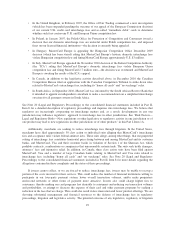MasterCard 2011 Annual Report Download - page 23
Download and view the complete annual report
Please find page 23 of the 2011 MasterCard annual report below. You can navigate through the pages in the report by either clicking on the pages listed below, or by using the keyword search tool below to find specific information within the annual report.Participation Standards
We establish and enforce our standards surrounding participation in MasterCard and the use and acceptance
of cards carrying our brands.
Rulemaking and Application of Standards
Participation in the MasterCard payments network is generally open to financial institutions and other
entities that are our customers. Applicants for participation must meet specified requirements. In general,
MasterCard grants licenses by territory to applicants that meet those specified criteria. Licenses provide
customers with certain rights, including access to the network and usage of our brands. Anti-money laundering
due diligence reviews and customer risk management reviews are conducted on all new customers prior to
issuing a license and existing customers are evaluated applying a risk-based approach. All customers must meet
the requirements of MasterCard’s anti-money laundering program, and MasterCard can suspend and ultimately
terminate participation for non-compliance with the program. As a condition of our licenses, customers agree to
comply with our standards, which include requirements set forth within our certificate of incorporation, bylaws,
policies, rules and operating regulations and procedures. MasterCard and certain of its affiliates are the governing
bodies that establish and apply our standards, which relate to topics such as participation eligibility and financial
soundness criteria; the standards, design and features of cards and card programs; the use of MasterCard
trademarks; merchant acquiring activities (including acceptance standards applicable to merchants); and
guaranteed settlement and customer failures.
Customer Risk Management
As a guarantor of certain obligations of principal customers, we are exposed to customer credit risk arising
from the potential financial failure of any principal customers of MasterCard, Maestro and Cirrus, and affiliate
debit licensees. Our gross settlement risk exposure for MasterCard, Maestro and Cirrus-branded transactions,
which is primarily estimated using the average daily card volume during the quarter multiplied by the estimated
number of days to settle, was approximately $39.1 billion as of December 31, 2011. Principal customers
participate directly in MasterCard programs and are responsible for the settlement and other activities of their
sponsored affiliate customers.
To minimize the contingent risk to MasterCard of a failure, we monitor the financial health of, economic
and political operating environments of, and compliance with our standards by, our principal customers, affiliate
debit licensees and other entities to which we grant licenses. If the financial condition of a customer or the state
of the economy or political environment in which it operates indicates that it may not be able to satisfy its
obligations to us or to other MasterCard customers, or its payment obligations to MasterCard merchants, we may
require the customer to make operational changes and/or post collateral. This collateral is typically in the form of
a standby letter of credit, a bank guarantee or a secured cash account and is required to mitigate our exposure. As
of December 31, 2011, we had customers who had posted approximately $3.5 billion in collateral held for
settlement exposure for MasterCard-branded transactions. If a customer becomes unable or unwilling to meet its
obligations to us or other customers, we are able to draw upon such customer’s collateral, if provided, in order to
minimize any potential loss to our customers or ourselves. In addition to obtaining collateral from customers, in
situations where a customer is potentially unable to meet its obligations to us or other customers, we can suspend
and ultimately terminate participation in our network. Additionally, and to further preserve payment system
integrity, MasterCard reserves the right to terminate a customer’s right to participate in our network if, for
example, the customer fails or refuses to make payments in the ordinary course of business, or if a liquidating
agent, conservator or receiver is appointed for the customer. In addition to these measures, we have also
established a $2.75 billion committed credit facility to provide liquidity for general corporate purposes, including
to provide liquidity in the event of customer settlement failure. See “Risk Factors-Business Risks-As a guarantor
of certain third-party obligations, including those of principal customers and affiliate debit licensees, we are
exposed to risk of loss or illiquidity” in Part I, Item 1A of this Report. See also “Risk Factors-Business Risks-
Unprecedented global economic events in financial markets around the world have directly and adversely
19


